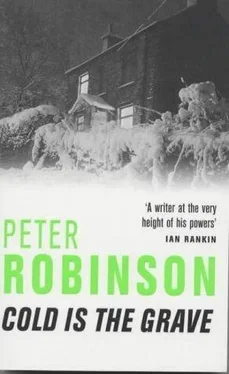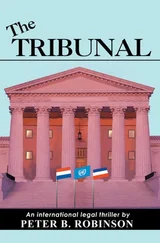Next, Dr. Lindsey began his dissection with the Y-incision. He took blood samples, then removed and inspected the inner organs, working from the trachea, esophagus and what was left of the heart, down to the bladder and spleen.
As all this was going on, Banks kept a close eye on Annie. He didn’t know how good she was at postmortems on fairly fresh corpses, as the last one they had been to was of a skeleton disinterred after fifty years. Though she paled a little when Dr. Lindsey opened up the body cavity and swallowed rather loudly as he squished out the various organs as if he were shucking oysters, she stood her ground.
Until, that is, the power saw started ripping into the front quadrant of the skull. At that, Annie swayed, put her hand to her mouth and, making a gurgling sound, dashed out of the room. Dr. Lindsey rolled his eyes and Collaton glanced at Banks, who just shrugged.
Dr. Lindsey pulled out the brain, looked it over, tossed it from hand to hand as if it were a grapefruit, then put it aside for weighing and sectioning.
“Well,” he said, “until we get the tests back on the blood and tissue samples, we won’t know whether he was poisoned before he was shot. I doubt it, myself. Judging by the blood, I’d say the gunshot wound was the cause of death. It blew his heart open. And going by the lividity, I’d also say he was killed at the same spot he was found.”
“Did you determine time of death?” Banks asked, though he knew it was the question all pathologists hated the most.
Dr. Lindsey frowned and searched through a pile of notes on the lab bench. “I made some rough calculations at the scene. Only rough, of course. I’ve got them somewhere. Now, where… ah here it is. Rigor, temperature… allowing for the chilly weather and the rain… he was found on Tuesday, that’s yesterday, at about four P.M., and I surmised he’d been dead at least twenty-four hours, perhaps longer.”
Charlie had been seen by his neighbor on Sunday afternoon at around two o’clock, and if he had been killed sometime Monday afternoon, that left over twenty-four hours, the last twenty-four hours of his life, unaccounted for. When they got back to Eastvale, Banks would have to initiate some house-to-house inquiries in the neighborhood, find out if anyone had seen Charlie later than Sunday lunchtime, and if anyone had seen him with anyone. He hadn’t got to the lane near Husbands Bosworth in his own car, and he certainly hadn’t walked there. The fresh tire tracks that Collaton’s men had found most likely belonged to the car that had taken him there, as the lane was an out-of-the-way place. Depending on how good the impressions were, it might be possible to match them up with a particular car – if, of course, they found the car, and if the tires hadn’t been changed.
They had learned just about all they could from Dr. Lindsey for the moment, and Banks thanked him for his prompt postmortem and left with Collaton, looking out for Annie as he walked along the corridors.
They found her standing out in the misty, gray afternoon taking deep breaths. When she saw them, she looked away and ran her hand over her chestnut hair. “Christ, I’m sorry. I feel such an idiot.”
“It’s all right,” said Banks. “Don’t worry about it.”
“It’s not that I haven’t been to one before.” She pulled a face. “I was okay, honest I was, until… It was the smell, the saw burning the bone, and the noise it made. I couldn’t… I’m sorry. I feel like such a fool.”
It was the first time Banks had seen any real break in Annie’s on-the-job composure. “I told you,” he said. “Don’t worry about it. Are you up to going home?”
She nodded. He imagined it would be a quiet journey. Annie was clearly pissed off at herself for showing signs of weakness.
Banks looked at Collaton. The indulgent expression on his face indicated he would probably have forgiven Annie anything .
It was late when Banks finally got home, after calling in at the station to issue some actions for the following morning. The traffic on the M1 was murder, especially around Sheffield, and patches of dense fog on the A1 meant they had to move at a crawl, keeping in view the rear lights of the lorry in front of them. Banks was reminded of the time when he was lost in the fog, heading for a friend’s house, and had blindly followed the car in front right into a private drive. He had been damned embarrassed when the irate driver came to ask him what the hell he thought he was doing.
Annie recovered from her little spell of embarrassment a lot quicker than Banks expected. He had to remind himself that this wasn’t Susan Gay, and that Annie didn’t worry so much about appearing weak or incompetent; she simply got on with her work and her life.
The fog in the dale slowed him down most on the last leg of his journey. Wraiths of gray mist nuzzled up the daleside and swirled on the road before him. The road ran several feet up the hillside from the valley bottom, where the River Swain meandered through The Leas, and most of the fog had settled low. Banks knew the road well enough not to take too many foolish risks.
Back at the cottage, he found two messages waiting. The first was from Tracy, asking him for ideas about what she should buy her mother for Christmas. A wedding dress, perhaps? Banks thought. But he wouldn’t say that to Tracy.
The next caller didn’t identify herself, but he knew immediately who she was: “Hello, it’s me. Look, I’m sorry I haven’t been in touch… it was probably very rude of me… I mean, I never really thanked you and all, did I, you know, for what you did for me? I suppose I was pretty fucked up.” There, she broke off and Banks could hear her suck on a cigarette and blow out the smoke. He thought he could hear background noise, too. “Anyway, you must let me buy you lunch at least. Hey, look, I’ll be over in Eastvale tomorrow, so why don’t you meet me at the Black Bull on York Road over from Castle Hill, say about one o’clock? Is that all right?” There was a silence on the line, as if she were actually expecting an answer. Then she sighed. “Okay, then, hope to see you tomorrow. And I’m sorry. Really, I am. Ciao.”
Banks remembered the last time he had seen Emily at the door of the old mill house, in the pink tracksuit he had bought for her on Oxford Street, an outfit she obviously loathed, giving him that enigmatic look as he delivered her to her parents. He remembered Jimmy Riddle’s clipped thanks and Rosalind’s cool silence. It was all unspoken, but he had sensed Riddle’s awkward, hidden love for his daughter and Rosalind’s distance.
So Emily Riddle wanted to thank him. Should he go? Yes, he thought, reaching for the bottle of Laphroaig; hell, yes, he would go.
The Black Bull was a young people’s pub at night, with live music and a steady supply of illegal drugs, mostly Ecstasy and crystal meth. It had been targeted by the Eastvale police’s “Operation Pubwatch” on more than one occasion, never without a few arrests being made. At lunchtime, though, it had a totally different character, and most of the customers worked in the various offices and shops along York Road. The only music issued quietly from the jukebox, and the only drugs being consumed were nicotine and alcohol, with perhaps a little caffeine for those who preferred tea or coffee with their pie and chips.
When Banks arrived spot on one o’clock, Emily was nowhere in sight. He bought himself a pint and found a table near the window. The road outside was busy, and the traffic splashed up dirty water from the roadside puddles.
As he was studying the blackboard and trying to decide between Bar BQ Chicken and Thai Red Curry, Emily breezed in, out of breath, the way Jenny Fuller always seemed to do, as if it had been a great effort getting there only fifteen minutes late. She plonked her bulging handbag on the chair beside Banks, gave him an impish grin and made for the bar. When she came back she was carrying one of those strange cocktails that young drinkers, especially female, seem to think are really interesting: in this case, Kahlua and Coke. She must have charmed the landlord into believing she was old enough to drink, Banks thought, though in all honesty she did look well over eighteen. She had a cigarette in her mouth almost before she sat down, a maneuver Banks was surprised she could make, given that her slightly flared blue jeans looked painted on. Still, it was a testament to Emily’s natural style that she didn’t look in the least bit tarty, and she had chosen to wear no makeup at all. Not that she needed any. Once she had lit her cigarette and had taken a sip of her drink, she shucked her mid-length jacket to reveal a black silk blouse. After she had tidied her hair, she seemed ready to talk, but she kept on fidgeting.
Читать дальше












